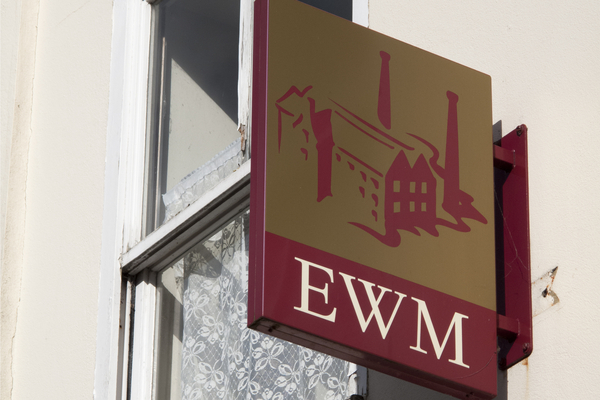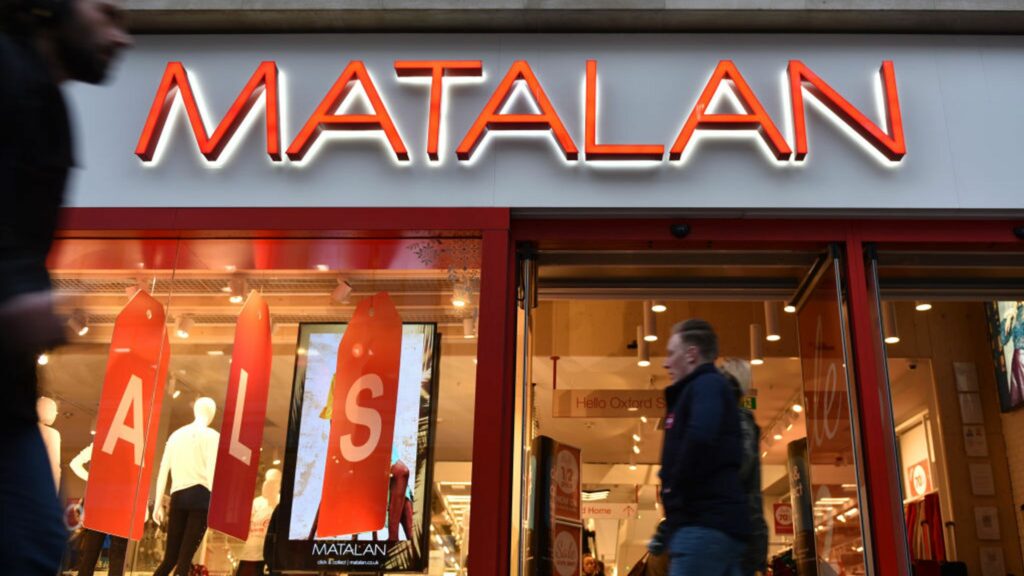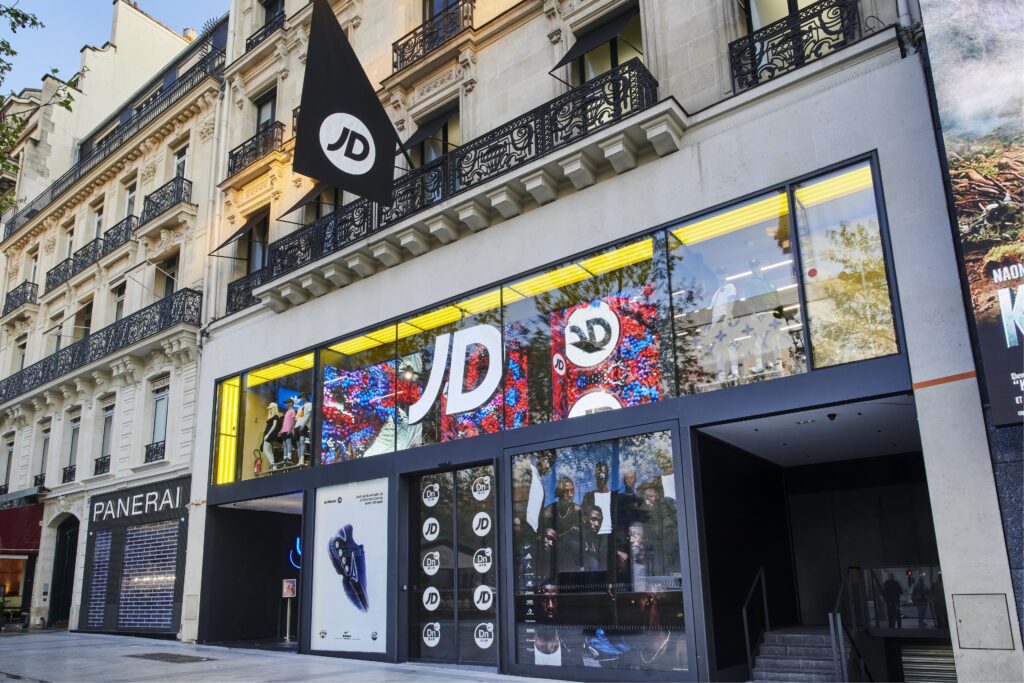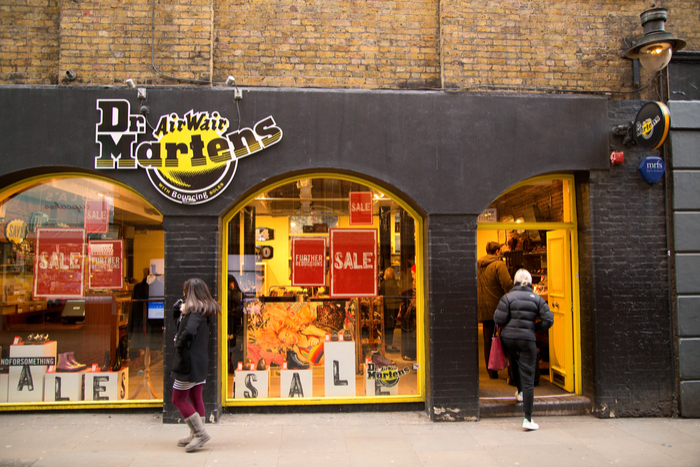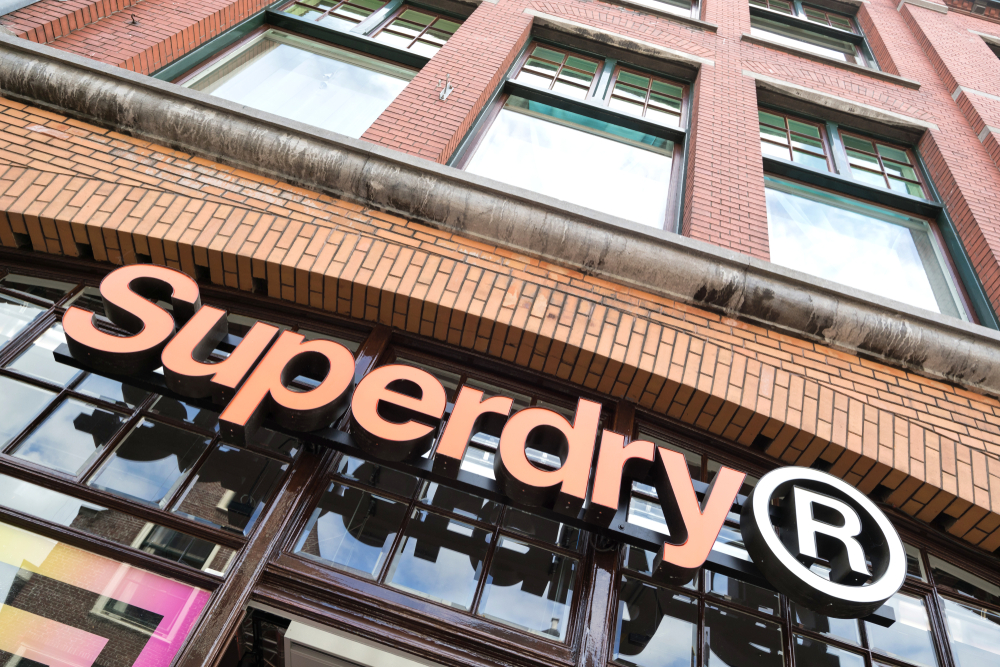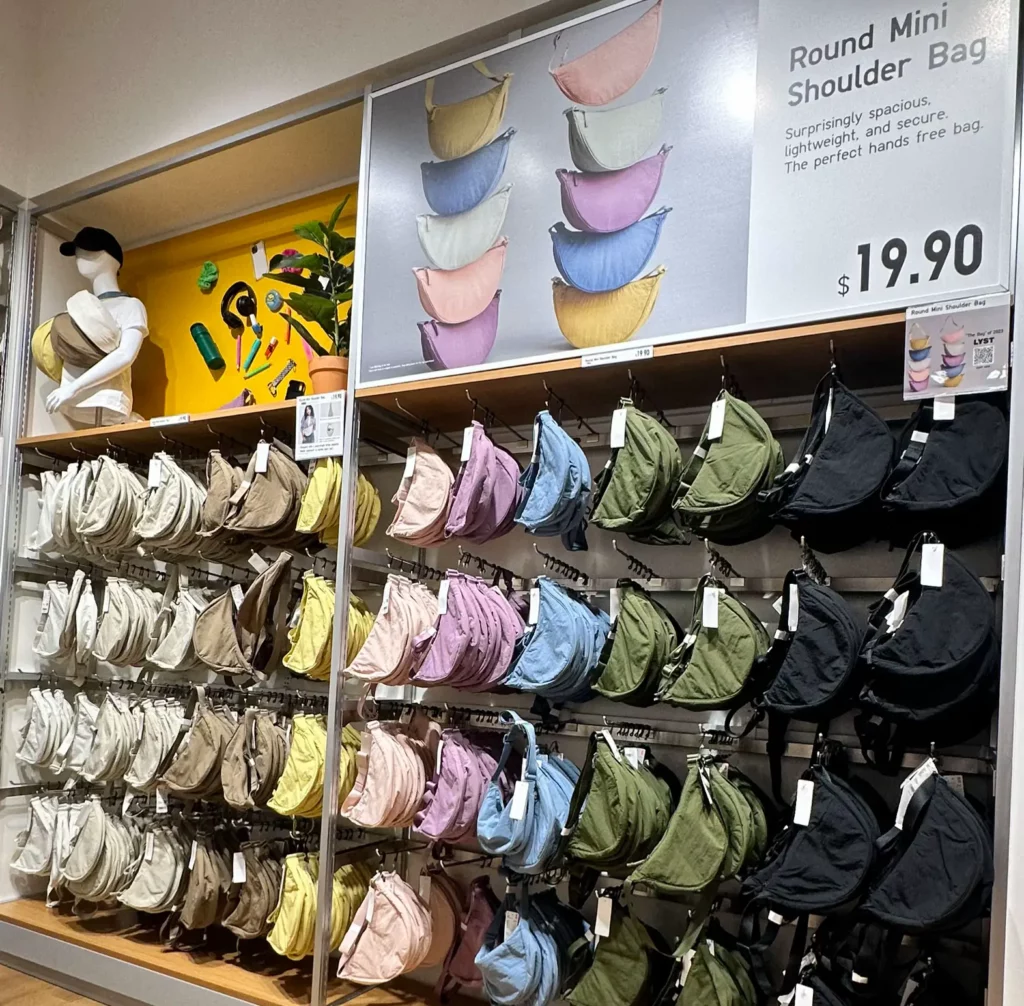A BRIEF TIMELINE
1946: Edinburgh Woollen Mill was founded by Andrew Stevenson as the Langholm Dyeing and Finishing Company Ltd, dyeing wool yarn to order.
1966: Stevenson’s eldest son David was appointed managing director.
1970: David Stevenson opened the first retail store in Randolph Place, Edinburgh.
1972: The first English store opened in Carlisle.
1988: David’s younger brother Neil Stevenson was appointed co-managing director of Langholm Dyeing and Finishing Company, helping increase its turnover to make it the largest package dyer of woollen yarns in the UK at the time. The brothers aimed to work together to expand the business from a small operation to a multi-million pound business.
1989: Andrew sold Langholm Dyeing and Finishing Company to manufacturing company Leeds Group in a deal worth £5 million. Leeds Group made an initial payment of £2.9 million with a further £1 million paid within two years, and an additional £1.2 million becoming payable if agreed profit levels were achieved.
Langholm Dyeing and Finishing Company had a turnover of £45 million at the time from spinning and weaving mills in Selkirk, manufacturing facilities in East Kilbride, and 125 retail outlets throughout the UK.
The company, which had 100 employees involved in dyeing and merchanting operations, made a pre-tax profit of £720,000 in the year to January 31, 1989.

1992: Neil Stevenson joined the Leeds Group board as an executive director.
1995: Neil announced his retirement.
2002: Langholm Dyeing and Finishing Company was rebranded as Edinburgh Woollen Mill after being bought out by the newly-formed Edinburgh Woollen Mill Group (EWM Group), led by Dubai-based British businessman Philip Day. The group opened a global distribution centre at Kingmoor Park in Carlisle.
2008: EWM Group bought home furnishing company Ponden Mill and soft furnishings company Rosebys. The latter’s stores were rebranded as Ponden Home across the UK.
2011: EWM Group acquired women’s fashion retailer Jane Norman, which had fallen into administration.
2012: EWM Group purchased clothing retailer Peacocks along with 388 stores, concessions, its headquarters and logistics functions.
2014: EWM Group placed Jane Norman into administration in June, but retained the brand and stock to sell as an online-only business.
2015: Jane Norman launched a new outlet store, more than a year after the chain‘s physical outlets closed, which allowed customers to purchase items with up to 70 per cent off the original price.
February 2016: EWM Group was prosecuted for mislabelling scarves as “100 per cent cashmere”.
November 2016: EWM Group purchased fashion retailer Austin Reed after it fell into administration. Day said at the time that he planned to open 50 new Austin Reed stores by 2018. EWM was also cleared of charges of mislabeling on its cashmere scarves after facing a four-day court battle.
March 2017: EWM Group secured pole position in the race to acquire struggling fashion retailer Jaeger from investment company Better Capital.
May 2017: EWM Group bought Jaeger. Day said the acquisition was part of EWM Group’s plans to open a new department store, called Days Department Store – the first of which opened in the former BHS premises in Guildhall Square, Carmarthen. The department store concept housed items from EWM Group’s stable of brands: Peacocks, Edinburgh Woollen Mill, Ponden Home, Jane Norman and Austin Reed. Day said at the time he planned to open over 50 of these department stores across the UK.
June 2017: Day was reported to be considering a bid for womenswear chains Warehouse, Oasis and Coast, after they were put up for sale in November 2016. Offers were between £35 million and £55 million.
December 2017: EWM Group saw profits and sales rise in the year to February 2017. Then-chief operating officer Steve Simpson suggested that the group could make more acquisitions in the near future.

2018: EWM Group announced plans to move its head office from Langholm to Carlisle. The group said at the time that its existing base, which was home to 190 workers, was unsuitable for a “modern, fast-growing, national retail development”. The firm hired an extra 10 people to work at the new, purpose-designed 30,000sq ft office called Global House, at 5 Castle Street.
February 2018: EWM Group rescued the UK arm of embattled menswear group Berwin & Berwin from administration – which owns brands including Lambretta, Paul Costelloe and Baumler – saving 800 jobs. That same month, EWM Group was also reported to be a potential buyer of electronics retailer Maplin as it sought to secure capital in order to avoid administration. These negotiations eventually broke down at the eleventh hour and EWM Group walked away from the potential rescue deal.
May 2018: EWM Group was set to undergo a restructure of roles at the head offices of its fascias as a recent spate of acquisitions has led an overlap in some roles. The restructuring would lead to an expected net loss of less than five staff members across the headquarters of its Jaeger, Austin Reed and Berwin & Berwin brands.
July 2018: EWM Group withdrew from talks with Wyevale Garden Centres over a potential takeover bid. The group said its interest in the retailer was always “soft” and its offer came well below the £300 million asking price.
August 2018: EWM Group was understood to be considering a rescue bid for struggling department store chain House of Fraser, after Hamleys’ then-owner C.Banner announced it was pulling out of talks with House of Fraser over a £70 million funding deal. That same month, EWM Group bought the owner of Jacques Vert, Eastex and Windsmoor, Calvetron Brands out of administration while placing its Jane Norman fascia on hold.

September 2018: EWM Group closed all of its Jane Norman, Jaeger and Jacques Vert concessions in House of Fraser stores following a tumultuous takeover process after Mike Ashley bought the department store chain out of administration in August for £90 million.
November 2018: EWM Group said it planned to more than triple Jaeger’s store estate – from nine to 30 – by the end of 2019 as it continued to undergo a revival.
February 2019: EWM Group sought to place a formal bid on a small number of Marks & Spencer and House of Fraser stores which were being closed.
April 2019: EWM Group withdrew from the race to acquire struggling lifestyle retailer LK Bennett from administration, confirming a “soft” interest. That same month, Day acquired more than half of Bonmarche’s shares through his holding company Spectre, which triggered a mandatory takeover bid. Although both owned by Day, Bonmarche is not part of the EWM Group.
June 2019: EWM Group recorded a pre-tax profit of £81.2 million for the 18 month period ending August 25, 2018. The group’s Peacocks fascia reported a pre-tax profit of £66.5 million for the 18-month period, while its eponymous Edinburgh Woollen Mill chain reported a pre-tax profit of £32.1 million.
EWM Group said it turned around the fortunes of Jaeger, revealing underlying losses came of £3.86 million, compared to a £7.1 million loss in the year prior to Jaeger’s administration in 2017.
July 2019: EWM Group put in an initial bid for struggling fashion retailer Jack Wills, joining the list of interested buyers, which included Mike Ashley’s Frasers Group, Crew Clothing and Ben Sherman’s parent company Marquee Brands. It eventually went to Frasers Group.
December 2019: EWM Group declared no dividend payout in its trading update, which showed trading for the 27 weeks to March 2, despite the company registering growth across the business. This compares to dividend worth £40 million that was declared and approved in the previous period, which covered 78 weeks ending August 25, 2018.
Edinburgh Woollen Mill on its own posted a profit after tax of £12 million for the 27-week period ending March 2, while Peacocks posted a profit after tax of £17 million.
March 2020: EWM Group made around 100 redundancies across head office and business function roles when it was just the early days of the Covid-19 pandemic. The group also placed a temporary ban on further recruitment as well as warning remaining staff that they may face a 50 per cent pay cut. On March 22, the group temporarily closed its 1300-plus stores across the UK in a effort to keep staff safe as part of the UK-wide lockdown – which lasted three months for non-essential retailers.

May 2020: The Bangladesh Garment Manufacturers and Exporters Association (BGMEA) warned EWM Group in a letter that they would blacklist the group for non-payment of suppliers in Bangladesh and for not returning their calls. The pandemic resulted in orders being cancelled or retailers asking for heavy discounts which led to workers going without pay or being fired. However, EWM Group defended its position by saying it had not received the letter until after it had appeared in local media and that it was the first time it had been contacted by the association.
September 2020: Reports emerge that EWM Group had seen some of its heritage brands approached by a number of interested buyers, including parties based in China. That same month, EWM Group appointed FRP advisory to sound out potential buyers for Peacocks. It confirmed at the time that this was a valuation process for Peacocks, and not a sales process.
October 2020: EWM Group was considering filing a lawsuit against BGMEA after it was accused of owing manufacturers £27 million in unpaid bills. The group informed BGMEA that these “old figures are completely baseless and without any merit”. Shortly after, reports emerged that Peacocks’ investment had been jeopardised after the allegations against EWM Group were brought forward by BGMEA.
October 9: EWM Group filed an intent to appoint administrators with the High Court. The move gave the firm some breathing space to look for potential buyers and put together a rescue plan – including an administration proposal – to shore up the business. The move placed around 24,000 jobs at risk. EWM Group executives told staff that the national lockdown over spring coupled with subdued footfall and localised restrictions since reopening had impacted sales across its fascias. The firm also said it had been impacted by allegations of unpaid bills, which it continues to deny.
October 15: EWM Group said it would close over 50 stores – putting 600 people out of work – after landlords criticised its administration proposals.
October 16: The British Property Federation condemned EWM Group’s administration proposals, saying that wealthy UK business owners were “manipulating and abusing” insolvency rules.

October 19: Reports emerge that Day was seeking to save Peacocks and jettison the rest of the EWM Group. Peacocks has about 400 stores and would be run alongside Bonmarché, the struggling womenswear retailer fashion chain that Day acquired under Spectre Holdings – which sits outside the EWM Group.
October 26: The High Court grants EWM Group’s intention to appoint administrators an extension of 10 working days to speak to potential suitors and work on a rescue plan. Mike Ashley’s Frasers Group was in talks with FRP advisers after expressing an interest in the Jaeger, Peacocks and Edinburgh Woollen Mill fascias.
October 27: EWM Group set aside several stores in its UK portfolio for permanent closure. Store staff said they had not been informed of these.
November 7: EWM Group confirmed that two of its retail brands – Edinburgh Woollen Mill and Ponden Home – fell into administration. The group permanently closed 56 Edinburgh Woollen Mill stores along with eight Ponden Home shops, axing 866 jobs and putting a further 1821 jobs under threat. The remaining 328 Edinburgh Woollen Mill and 65 Ponden Home stores will continue to trade, Covid-19 restrictions permitting, while a buyer is sought.
November 9: Ashley expressed his anger after Frasers Group was reportedly excluded from the auction of three EWM Group brands. Frasers Group said the advisers made “no real attempt to engage with us as a committed and willing purchaser”. However, EWM Group responded that all bidders for Peacocks and Jaeger had “access to the same information and ample opportunity to make an offer”.
Now: The sale process for Peacocks is codenamed Project Centaur; while Edinburgh Woollen Mill was codenamed Project Castle.
THE REASONS
EWM Group’s problems were conspicuous at the beginning of 2020 – before the Covid-19 pandemic gripped the UK – when it made around 100 redundancies across head office and business function roles.
Thing changed quickly when the pandemic sent the world spiralling in March, and the subsequent national lockdown over spring put a further strain on EWM Group after it was forced to temporarily close its 1300-plus stores in a effort to keep staff safe.
EWM Group’s flagship retail chain Edinburgh Woollen Mill is a mainstay on British high streets and also runs a raft of other retail brands including Jaeger, Austin Reed, Peacock, Ponden Home, Days Department Store, and others. Many of these retailers were acquired over the past 10 years when they were amidst financial difficulties.
“Peacocks & Jaeger won’t be immune to the problems Edinburgh Woollen Mill has faced”
At present, only the eponymous Edinburgh Woollen Mill brand and homeware retailer Ponden Homes have entered administration, after Philip Day failed to find a buyer or secure fresh investment. EWM Group’s other fascias are safe for the time being, although a rescue plan or a new buyer are being sought for them.
The national lockdown over spring piled pressure on EWM Group, which was already feeling the stress of a struggling retail sector. EWM Group said that while the business had received “a number of expressions of interest for various parts of the group”, the administration would give it “necessary breathing space” while it assesses the various options available.
Patrick Elliot, insolvency partner at Keystone Law, told Retail Gazette that although it seems EWM Group has put its weakest performers into administration to strengthen its overall performance, there remains a risk for its remaining brands. Daniel Clarke, an associate partner at law firm Pannone Corporate agreed.
“The likes of Peacocks and Jaeger operate in the same broad retail space. As such, they’re not going to be immune to the problems that Edinburgh Woollen Mill has faced,” he said.
“However, they have avoided administration thus far, so clearly there is some optimism that they can still be rescued.”
Clarke added that despite its losses, Edinburgh Woollen Mill holds “strong customer recognition and trust” and there remains an opportunity for any potential buyer to restructure and streamline the business.
By closing 56 under-performing stores since administration proposals were launched, Clarke said the business should now be a more attractive proposition for a potential buyer.
Retail expert Nelson Blackley told Retail Gazette that Peacocks remains at threat because of its value-conscious customer base. It is facing increased competition from retailers such as Primark, Matalan, and grocers’ own-brand clothing concessions such as Tesco’s F&F, George at Asda, and Poundland’s Pep&Co.
“The eventual fall into administration isn’t a surprise in an increasingly competitive retail sector”
“There is no doubt that the Peacocks retail brand, which operates around 550 locations in ‘non-prime’ locations on local high streets and in provincial shopping centres, has really struggled recently,” Blackley explained.
“Indeed, around half of their stores have remained closed and some of its staff on furlough even following the end of the first national ‘lockdown in mid-June.”
Moreover, he argued that many of the Edinburgh Woollen Mill stores sell a mixture of knitwear and Scottish-themed gifts to a mainly older customer demographic, and are found in the major tourist destinations.
Footfall in all these locations, particularly from international visitors, has been much lower since the pandemic due to international travel restrictions. In addition, any bounce-back in retail tourism is unlikely to happen after the government’s recent decision to scrap tax-free shopping for non-EU international shoppers.
Blackley also argued that Day failed to invest enough in EWM Group’s online operations, which meant its brands were unprepared for the surge in online shopping that came with the onset of lockdown.
“Ponden Home is a relatively small chain, and so the Covid-19 impact has been less, but it has faced intense competition recently from much larger rivals, for example The Range, B&M, Home Bargains and the major supermarkets,” Blackley said.
“So as a part of the Edinburgh Woollen Group that has always been less attractive for bidders, its eventual fall into administration is not a huge surprise in an increasingly competitive retail sector.”
Edinburgh Woollen Mill’s administrators have indicated that the retailer was trading well pre-pandemic, but the strain of the last six to seven months seems to have created irreparable issues.
Arguably, the retailer’s primary target demographic may have been either been reluctant or unable to participate in the sudden rise in online shopping. And while Day has also seemingly been reluctant to invest in the group’s online operations, the combination of these has led to Edinburgh Woollen Mill’s demise.
Although the remaining brands may witness a recovery once leisurely travel is permitted, for a long-term recovery, Day may need to focus on bolstering the group’s online operations in an effort to avoid further collapse.
Click here to sign up to Retail Gazette’s free daily email newsletter

